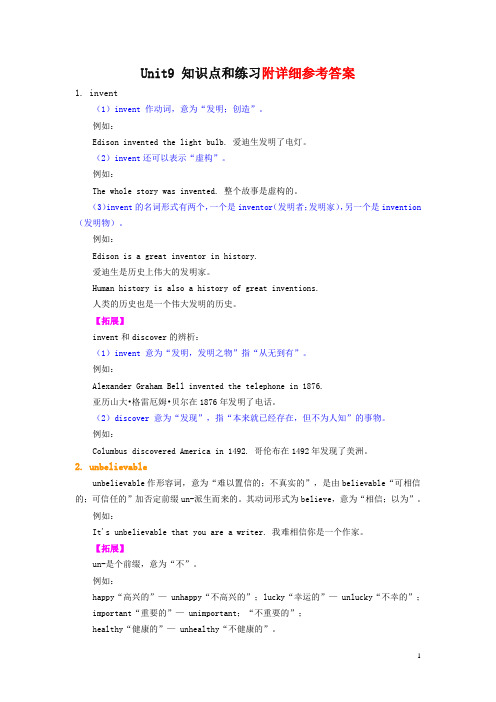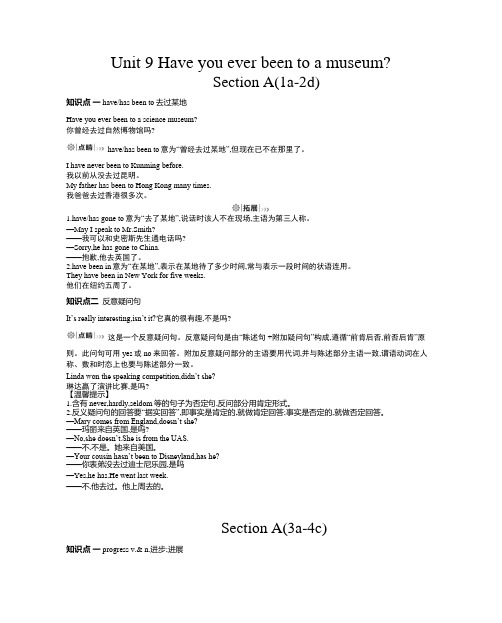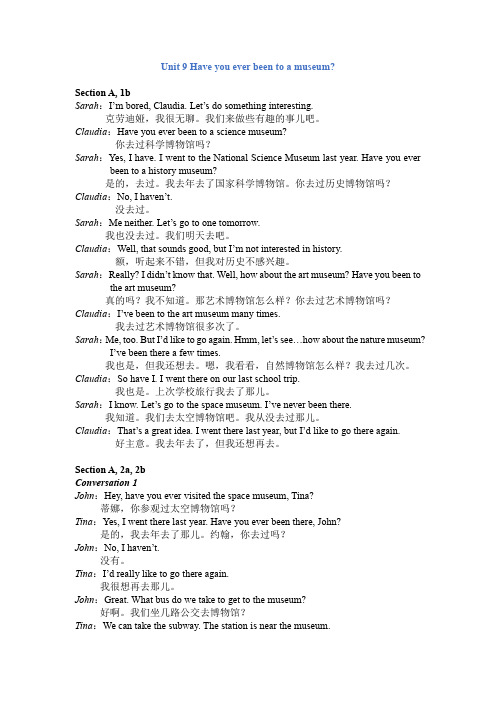最新人教版英语八年级下册unit 9《have you ever been to a museum》教案.doc
人教版新目标英语八年级下册:Unit 9《Have you ever been to museum》 讲解+练习题目+答案

Unit9 知识点和练习附详细参考答案1. invent(1)invent 作动词,意为“发明;创造”。
例如:Edison invented the light bulb. 爱迪生发明了电灯。
(2)invent还可以表示“虚构”。
例如:The whole story was invented. 整个故事是虚构的。
(3)invent的名词形式有两个,一个是inventor(发明者;发明家),另一个是invention (发明物)。
例如:Edison is a great inventor in history.爱迪生是历史上伟大的发明家。
Human history is also a history of great inventions.人类的历史也是一个伟大发明的历史。
【拓展】invent和discover的辨析:(1)invent 意为“发明,发明之物”指“从无到有”。
例如:Alexander Graham Bell invented the telephone in 1876.亚历山大•格雷厄姆•贝尔在1876年发明了电话。
(2)discover 意为“发现”,指“本来就已经存在,但不为人知”的事物。
例如:Columbus discovered America in 1492. 哥伦布在1492年发现了美洲。
2. unbelievableunbelievable作形容词,意为“难以置信的;不真实的”,是由believable“可相信的;可信任的”加否定前缀un-派生而来的。
其动词形式为believe,意为“相信;以为”。
例如:It's unbelievable that you are a writer. 我难相信你是一个作家。
【拓展】un-是个前缀,意为“不”。
例如:happy“高兴的”— unhappy“不高兴的”;lucky“幸运的”— unlucky“不幸的”;important“重要的”— unimportant;“不重要的”;healthy“健康的”— unhealthy“不健康的”。
初中英语人教版八年级下册Unit 9 Have you ever been to

Unit 9 Have you ever been to a museum?教学目标1.语言目标:掌握谈论过去经历及好玩地方的相关词汇。
2.技能目标:能听懂谈论过去经历的对话材料;通过听说训练,学会谈论好玩的地方;能写出重点单词和重点句型,并能描述旅游地方。
3.情感目标:通过本课的学习,让学生掌握主题公园和博物馆的英文名称,培养学生热爱祖国大好河山的精神。
教学重点句子:1.—Have you ever been to a science museum?—Yes,I have.I went to the National Science Museum last year.2.—I have never been camping. —Me neither.3.It also encourages governments and social groups to think about ways toimprove toilets in the future.4.—I have been to the art museum many times.—Me too.And I have also visited the nature museum.5.Have you visited the Palace Museum?6.Have you been to the Great Wall?7.You won’t have any problem getting rice,noodles or dumplings.教学难点1.能熟练掌握并使用have / has been to以及already,ever与yet的用法。
2.能够运用所学句型谈论过去的经历。
第一课时Section AStep 1 GreetingNice to meet you! Nice to meet you,tooWhat day is it today? It is Monday.What is the date today? It is Juan 12th.How are you? -------Step 2 Guide1.Revise the present perfectUse some pictures about Beijing Shanghai Guilin Nanning Guangzhou Wuzhou,and then ask the students to answer the teacher’s question,e.g:—Have you ever been to-----------?—Yes,I have.No, I haven’t.2.Look at the picture and learn the new words.Step3 PresentationGuess the places of the pictures; they are the British Museum, space museum, history museum, water park, zoo, amusement park while lead in sentence patterns:“ Have you ever been to …?”Get students to work in pairs to practice the conversatio n: “Have you ever been to…”“Yes, I have.”/ Not, I haven’t.Step4 Pre-listening1a.1.Please read the names of these places. (Teacher writes the names on the blackboard.) Which of these places would you like to visit? Rank them from 1 to 5.S4: Amusement park _____, water park _____, zoo _____ aquarium _____ space museum _____.S5: Space museum _____, aquarium _____, zoo _____, water park ____, amusement park _____S6: …2. Talk about the picture.Step 5 ListeningListen and choose the best answer. The first and the second question aim to listening to time, and the third one aims to listen for the relationship. This activity trains students’ listening ability for listening for specific relationship.1)When did Sarah visit the National Science Museum?A. Today.B. Yesterday.C. Last year.2)When did Claudia visit the nature museum?st year.B. Last summer.C. Last school trip.3)What may the relationship be between the two speakers?A. Friends.B. Teacher and student.C. Mother and kid.Keys: 1-3 CCAListen again. Listen and check the boxes. Have these students ever been to theseAsk and answer in pairs:A: L et’s go somewhere different today.B: OK. Where do you want to go?A: Have you ever been to the space museum?B: No, I haven’t. How a bout you?A: …Step7 Listening2a. Listen and circle the places that you hear.2b. Listen again and circle T for true or F for false.Conversation 11. Tina went to the space museum last year. T/F2. John has never been to the space museum. T/F3. They are going to take the subway. T/FConversation 21. Linda has been to the amusement park. T/F2. Linda went to the amusement park yesterday. T/F3. Linda is going to the amusement park again by bike. T/FConversation 31. Frank had a great time at the water park. T/F2. Frank’s friend has never been to the water park. T/F3. Frank and his friend are going skating. T/FKeys: TFT TFT FTTSpeakingLook at the map in 2a and make conversations about the places.A: Have you ever been to the space museum?B: Yes, I have. How about you?A: No, I haven’t.B: Oh, it’s fantastic. Let’s go tomorrow.A: OK. How are we going to get there?B: We can take the subway.SpeakingRole-play the conversation in 2d.A: I went to the film museum last weekend. Have you ever been there? …B: Yes, I have. I went there back in April. ……Step8 Language points1. I learned about the inventions that led to color movies, too. 我还了解了一些发明,它们成就了彩色电影。
新课标人教版八年级英语下册Unit 9 Have you ever been to an amuse

—So did Tina.
中国地图
蒂娜也去了。
—He has been a soldier for two years.
要点点拨
他已经当了两年兵了。
go inline skating 滑旱冰
—So have I.
我也是。
全析提示
3.Look at the map of the town.Listen and circle the places 助动词 have 和 has 可以与前面的
you hear.
主语缩略’ve 和’s。
看城镇的地图。听录音并圈出你听到的地方。
如:we’ve,they’ve,he’s,
water world 水上世界
it’s 等。
city library 城市图书馆
have not 常缩略为 haven’t,has
fun times amusement park
如果说“欢迎回家”该怎么说呢?
把 1a 中你的回答和你搭档的回答对照一下。
Wele back home!
4.For me,“I have to!” is number two.
对我来说“I have to!”是第二位的。
要点点拨
5.Listen to a teacher interview a student.Circle the newsletter 业务通讯;新闻信札
route“路线、小路、小巷”,使
The main attraction was a Charlie Chaplin film.
用 X 围也较小。course 表示船的
吸引人的主要是查理·卓别林的电影。
“航道”或飞机的“航线”。
The idea of being a teacher has little attraction to young
新版八年级英语下册unit_9_have_you_ever_been_to_a_museum_Section_A_1

你曾经去过 博物馆吗?
语言目标: 讨论过去的 经历
1a Which of these places would you like to visit? Rank them from 1(most) to 6 (least).
space museum____ history museum____ art museum ____ zoo ____ water park ____ amusement park ____
Listening 2 2a
Look at the map of the town. Listen and circle the places you hear.
Listening 2 2b Listen again and circle T for true or F for false. Conversation 1 1. Tina went to the space museum last year. T/F 2. John has never been to the space museum. T/F 3. They are going to take the subway. T/F
improve
progress
unusual peaceful invented rapid
Have you ever been to science museum?
Yes, I’ve been to a science museum
No, I’ve never been to a science museum Yes, I have. I went there last year,/No, I haven’t. Me, too. And I’ve also visited the nature museum.
新课标人教版八年级英语下册Unit 9 Have You Ever Been to an Amuse

Unit 9 Have You Ever Been to an Amusement Park?一、学习目标:1.掌握现在完成时的用法;2.了解一般过去时、现在完成时和现在完成进行时的意义的区别;3.能够准确使用多种时态谈论自己的经历。
二、学习重点难点:1. 现在完成时由主语+have/has+过去分词构成。
其主要用法如下:I.在未指明具体时间的情况下,现在完成时动词通常可以表示在说话之前已经完成,而后果或影响至今仍存在的动作。
例如:The concert has started. 音乐会已经开始。
I have had breakfast. 我已吃过早饭。
注意:have gone to 和have been to 在意义上有区别。
例如:He has gone to Hong Kong. 他到某某去了。
(他已前往某某,或在途中,或已到达。
说话人暗示他现在不在现场。
)He has been to Hong Kong. 他曾到过某某。
(说话人认为他过去到过某某,现在已不在该地。
言外之意他对某某有所了解。
)II. 现在完成时动词可以表示开始于过去持续到现在(也许还会继续进行下去)的动作或状态。
例如:1) I have studied English since last year. 我从去年开始学习英语。
2) She has lived in Beijing for five years. 她住在已经五年了。
注意:e, go , leave, arrive, buy, lose, receive, join, die, bury 和marry 等动词所表示的动作是一时的,不能延续的,故不能与for …,since …等开头的表示一段时间的状语连用。
不过,这些词用于否定句则可以与表示持续的时间状语连用,即动作的不发生是可以持续的。
例如:不能说:*He has e to Beijing for two years.*He has bought that book for three weeks.*He has joined the Army for one and a half years.*His grandma has died for nine months.* I have received his letter for a month.可以说:He has been in Beijing for two years.He has had that book for three weeks.He has been in the army for one and a half years.His grandma has been dead for nine months.I haven't received his letter for almost a month.或者:It is two years since he came to Beijing.It is three weeks since he bought that book.It is one and a half years since he joined the Army.It is nine months since his grandma died.2. 现在完成时把过去的动作和现在的结果联系起来,一般过去时只限于表示过去的动作本身,与现在的结果无关。
人教新目标版初中英语八年级下册Unit9Haveyoueverbeentoamuseum要点讲解

Unit 9 Have you ever been to a museum?Section A(1a-2d)知识点一have/has been to去过某地Have you ever been to a science museum?你曾经去过自然博物馆吗?have/has been to意为“曾经去过某地”,但现在已不在那里了。
I have never been to Kunming before.我以前从没去过昆明。
My father has been to Hong Kong many times.我爸爸去过香港很多次。
1.have/has gone to意为“去了某地”,说话时该人不在现场,主语为第三人称。
—May I speak to Mr.Smith?——我可以和史密斯先生通电话吗?—Sorry,he has gone to China.——抱歉,他去英国了。
2.have been in意为“在某地”,表示在某地待了多少时间,常与表示一段时间的状语连用。
They have been in New York for five weeks.他们在纽约五周了。
知识点二反意疑问句It’s really interesting,isn’t it?它真的很有趣,不是吗?这是一个反意疑问句。
反意疑问句是由“陈述句 +附加疑问句”构成,遵循“前肯后否,前否后肯”原则。
此问句可用yes或no来回答。
附加反意疑问部分的主语要用代词,并与陈述部分主语一致,谓语动词在人称、数和时态上也要与陈述部分一致。
Linda won the speaking competition,didn’t she?琳达赢了演讲比赛,是吗?【温馨提示】1.含有never,hardly,seldom等的句子为否定句,反问部分用肯定形式。
2.反义疑问句的回答要“据实回答”,即事实是肯定的,就做肯定回答;事实是否定的,就做否定回答。
—Mary comes from England,doesn’t she?——玛丽来自英国,是吗?—No,she doesn’t.She is from the UAS.——不,不是。
人教版英语八下U9Have you ever been to a museum 讲义

Unit9 Have you ever been to a museum?一、重点词汇及拓展1. amusement n. 娱乐;游戏e.g. The old ladies played the games just for amusement.老太太们玩这个游戏只是为了取乐。
amuse v. 消遣,逗笑;使开心,使愉快amusing adj. 有趣的,好玩的,好笑的amused adj. 被逗乐的;感到好笑的2.amusement park 游乐场e.g. The amusement park is open from May through October.游乐园从五月到十月开放。
3.somewhere adv. 在何处;到某处pron. 某个地方e.g. Maybe the keys are somewhere in the dining room.也许钥匙在餐厅某个地方。
I need to find somewhere to stay tonight.我得找到今晚要住的地方。
4.camera n.照相机;摄影机;摄像机e.g. I heard your parents bought you a cameras as a gift.我听说你的父母亲给你买了一台照相机作为礼物。
5.invention n.发明;发明物e.g. Do you think mobile phone is a great invention?你认为手机是一个伟大的发明吗?6.invent v.发明;创造inventor n.发明家invention n.发明;发明物e.g. As we all know that Edison invented light bulb.我们都知道爱迪生发明了灯泡。
7. unbelievable adj. 难以置信的;不真实的unbelievably adv. 难以置信地;不真实地unbelievably bad/good 坏得/好得令人难以置信incredible adj. 难以置信的e.g. I still find this story both fascinating and unbelievable.我仍然觉得这个故事非常有趣和难以置信。
人教版英语八年级下册Unit 9听力原文及翻译

Unit 9 Have you ever been to a museum?Section A, 1bSarah:I’m bored, Claudia. Let’s do something interesting.克劳迪娅,我很无聊。
我们来做些有趣的事儿吧。
Claudia:Have you ever been to a science museum?你去过科学博物馆吗?Sarah:Yes, I have. I went to the National Science Museum last year. Have you ever been to a history museum?是的,去过。
我去年去了国家科学博物馆。
你去过历史博物馆吗?Claudia:No, I haven’t.没去过。
Sarah:Me neither. Let’s go to one tomorrow.我也没去过。
我们明天去吧。
Claudia:Well, that sounds good, but I’m not interested in history.额,听起来不错,但我对历史不感兴趣。
Sarah:Really? I didn’t know that. Well, how about the art museum? Have you been to the art museum?真的吗?我不知道。
那艺术博物馆怎么样?你去过艺术博物馆吗?Claudia:I’ve been to the art museum many times.我去过艺术博物馆很多次了。
Sarah:Me, too. But I’d like to go again. Hmm, let’s see…how about the nature museum?I’ve been there a few times.我也是,但我还想去。
嗯,我看看,自然博物馆怎么样?我去过几次。
- 1、下载文档前请自行甄别文档内容的完整性,平台不提供额外的编辑、内容补充、找答案等附加服务。
- 2、"仅部分预览"的文档,不可在线预览部分如存在完整性等问题,可反馈申请退款(可完整预览的文档不适用该条件!)。
- 3、如文档侵犯您的权益,请联系客服反馈,我们会尽快为您处理(人工客服工作时间:9:00-18:30)。
“科研兴课优质达标”
1.课题:U n i t9H a v e y o u e v e r b e e n t o a n a m u s e m e n t p a r k?
2.课型:新授
3.3.辅助工具:多媒体,班班通
本单元以“Fun places”为话题,通过单元教学,要求学生通过描述过去经历的功能句式,学习现在完成时的用法,并能区别现在完成时和一般过去时在表述过去经历的不同。
本课时是此单元的第一课时,内容有Section A :1a, 1b, 1c, 2a, 2b, 2c. Section A 1a呈现了几个有趣的地方,在帮助学生学习新词汇的同时,也激发他们的学习兴趣。
1b是一个听力活动,初步呈现了本单元的目标语言,即现在完成时。
要求学生听录音对话,判断Claudia和Sarah分别去过哪些地方。
1c 是一个口头练习,学生将结对用目标语言对图片中的几个地方进行会话练习。
2a和2b是两个听力活动,学生将听到三个对话,要求学生能将听到的地名圈出来,并根据所听内容判断一些句子的正误。
2c是会话活动,要求学生根据听力活动中的对话做角色扮演,谈论去过哪些地方,想去哪些地方以及打算如何去。
第五课时 Exercises
I. 根据单词首字母提示和句意完成下面的句子(10分)
1. Holland is a E_______ country.
2. He likes singing, e________ singing pop songs.
3. Our new English teacher can play many m_________ instruments.
4. Maybe when I g_________ I’ll be a flight a ________.
5. She has never been to an a____________ park. N __________ have I.
6. There is an old f___________ car in the museum.
7. I d_________ that secret.
II. 连词成句:(20分)
1. ever, you, to, been, have, museum, the
_______________________________
2. to, we, Water World, the, went, last year
_______________________________
3. I, see, language, movies, English, to went
_______________________________
4. next, is, to, the, going, zoo, week, he
_______________________________
5. the, for, years, job, twenty, she had, has
_______________________________
III. 单项选择:(20分)
1. Mary has gone to the teacher’s office. ____________ has Joan.
A. And
B. Neither
C. So
D. But
2. He’d like ___________ to the supermarket.
A. going
B. goes
C. go
D. to go
3. My little brother has never been to __________ amusement park.
A. a
B. an
C. /
D. the
4. Many of buses and taxis ___________ busy.
A. be
B. are
C. is
D. am
5. Animal globes are ____________ very popular gifts.
A. a kind of
B. kind of
C. the kind of
D. kinds of
6. There are many _______ for visitors to the beach.
A. ride boat
B. boat ride
C. boat rides
D. the boat rides
7. Li Hua’s house is very far. She ________ the subway to school every day.
A. takes
B. take
C. will take
D. by
8. _______ have you been studying English?
A. When
B. How
C. How long
D. How many
9. Please come here. I need __________ you several questions.
A. ask
B. to ask
C. asking
D. for asking
10. I’m feeling better, so I’ve started ________.
A. taking lessons
B. to take lesson
C. taking lesson
D. take lesson
IV. 根据句意完成句子(20分)
1. 你去过说英语的国家吗?没有去过。
________ you ever ______ English-speaking countries?
No, I ________.
2. 这个孩子要了五十元钱去买了CD盘。
The child ________ 50 yuan _________ some CDs.
3. 他们已经决定学习英语了。
They ____________________ to study English.
4. 学好英语的最好方法是尽可能的多说。
____________ to study English well ____________ speak as often as possible.
5. 我妈妈在这家医院已经当医生十三年了。
My mom ________________ a doctor in this hospital ___________ 3 years.
6. 我发现足球赛确实很精彩。
I found the football match ___________________.
7. 我正在考虑飞往上海而不是乘火车。
I’m thinking about ___________ to Shanghai rather than ___________ there ______ train.
8. 我爷爷没有去过美国。
我爸爸也没有去过。
My grandfather _____________ to America. ________ my father.
9. 他们两个以前都不喜欢看电视。
________ of them _________ watching TV.
10. 我的听力技巧需要提高。
My _____________ skills need ___________.。
